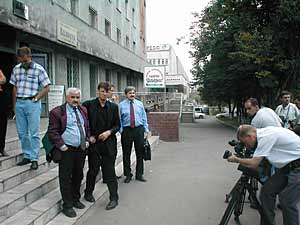
New Managing Director for Bellona Norway
The Board of the Bellona Foundation has appointed former Minister of Climate and the Environment Sveinung Rotevatn as Managing Director of Bellona No...
News

Publish date: September 4, 2001
Written by: Jon Gauslaa
News
The state secrets experts appeared in Vladivostok on August 29. It turned out to be eight of them, seven from the 8th Department of the Ministry of Defense and one from the Ministry of Nuclear Energy, who previously worked for many years in the 8th Department.
Court rejects defense motion
The task of the secrecy experts is to evaluate whether there are state secrets or not in the materials that allegedly were confiscated at Paskos flat in 1997. Questioning the objectiveness and legal competence of the experts, the defense-team filed a motion claiming that the Court should disqualify the experts from taking further part in the trial.
They all have a special security clearance issued by the FSB, which gives them access to secret information, Ivan Pavlov explained. Because of their security clearance they get a higher salary. If they loose their clearance they will also loose their position and their salary will decline. Thus, they are not independent from the body that initiated the case. Besides, they will answer questions of legal character, and without any legal education they are simply not competent to answer the questions properly, Pavlov said.
The Court rejected the motion, which hardly left the defense devastated. We wanted to underline that it is the judges of the Pacific Fleet Court and not the experts, that will make the final evaluation of whether there are state secrets or not in the disputed materials, said Pavlov. And that is what we did.
In contrast to the defense, Prosecutor Aleksandr Kondakov did not waive his right to ask questions to the experts. It turned out that he had copied the questions FSB-investigator Egorkin wrote in 1998. The defense drew the Courts attention to the fact that the case no longer is on the stage of preliminary investigation, but at the trial stage, where the task for the prosecution is to substantiate its charges. As a result of this, the questions previously asked by the FSB cannot just be repeated. The Court did apparently agree, as it rejected the prosecutors questions and came up with its own comprehensive lists of questions.
– The way the Court has asked the questions indicates that it, no matter what the experts’ conclusions will be, is concerned with giving its own objective evaluation of the questions regarding the presence of state secrets in the disputed materials, Pavlov said.
After having received the questions from the Court, the experts withdrew to their quarters somewhere in Vladivostok so that they can do their job in secrecy. It is not yet known when they will pop up with their conclusions, but that may well take some weeks.
This left the Court with no other option than to call in handwriting experts in order to hear their opinion. It could have been used as a basis for an appeal demanding that the verdict should have been cancelled if the Court in the said situation had not called in the experts. Thus, taking into consideration that the case against Pasko has been going on for almost four years, it may be a good sign that the Court this time has chosen a more detailed approach than what it did at the previous trial in 1999.
Journalist Grigory Pasko was arrested on November 21, 1997 and charged with espionage in favor of the Japanese TV-channel NHK. At his first trial in July 1999, he was acquitted for espionage, but in stead convicted for abuse of his official authority and released under a general amnesty. After appeals from both sides, the Military Supreme Court cancelled the verdict on November 21, 2000, and sent the case back to the Pacific Fleet Court for a re-trial. The re-trial started in Vladivostok on July 11, 2001.

The Board of the Bellona Foundation has appointed former Minister of Climate and the Environment Sveinung Rotevatn as Managing Director of Bellona No...

Økokrim, Norway’s authority for investigating and prosecuting economic and environmental crime, has imposed a record fine on Equinor following a comp...

Our op-ed originally appeared in The Moscow Times. For more than three decades, Russia has been burdened with the remains of the Soviet ...

The United Nation’s COP30 global climate negotiations in Belém, Brazil ended this weekend with a watered-down resolution that failed to halt deforest...